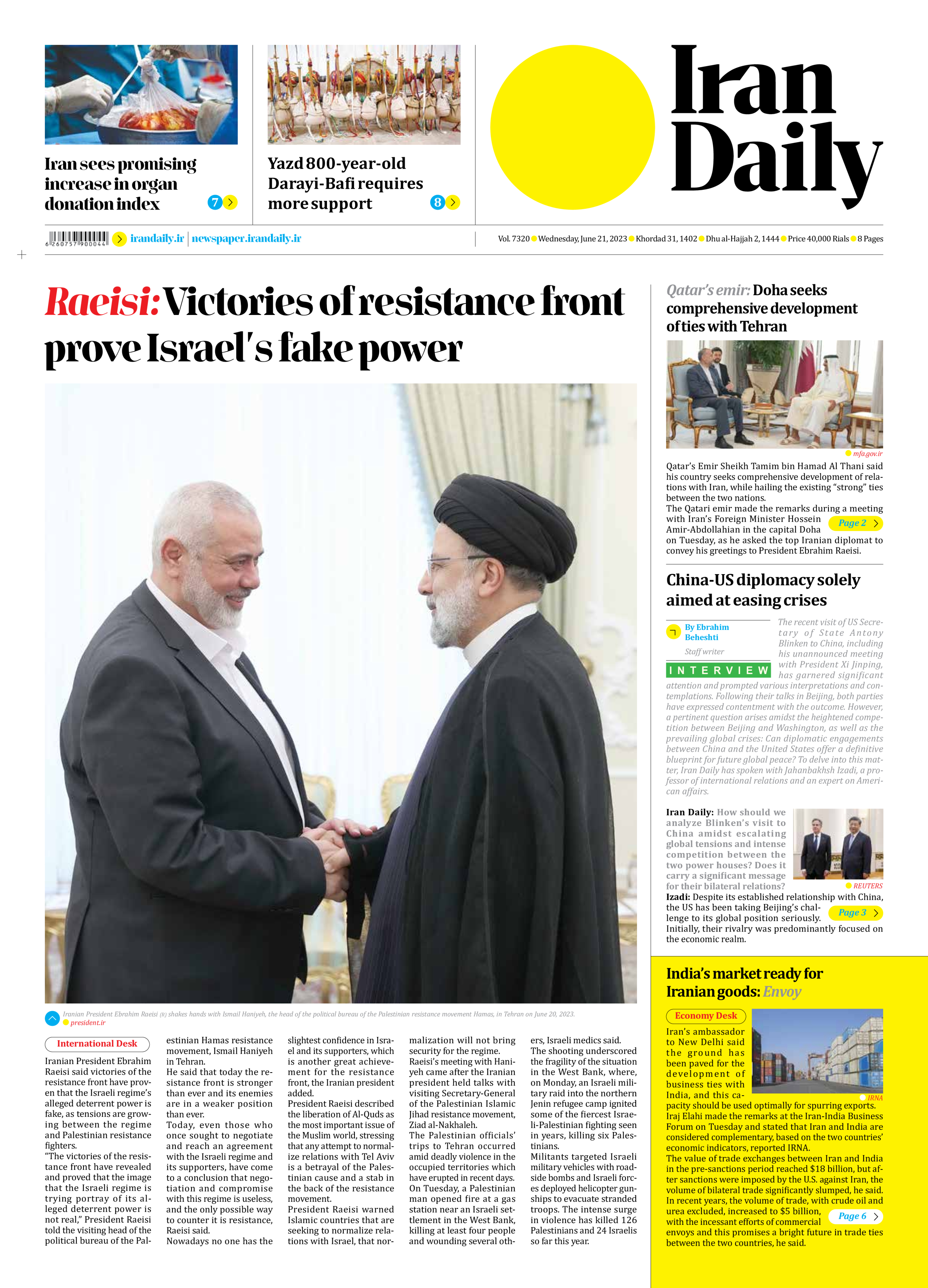
China-US diplomacy solely aimed at easing crises
By Ebrahim Beheshti
Staff writer
The recent visit of US Secretary of State Antony Blinken to China, including his unannounced meeting with President Xi Jinping, has garnered significant attention and prompted various interpretations and contemplations. Following their talks in Beijing, both parties have expressed contentment with the outcome. However, a pertinent question arises amidst the heightened competition between Beijing and Washington, as well as the prevailing global crises: Can diplomatic engagements between China and the United States offer a definitive blueprint for future global peace? To delve into this matter, Iran Daily has spoken with Jahanbakhsh Izadi, a professor of international relations and an expert on American affairs.
Iran Daily: How should we analyze Blinken’s visit to China amidst escalating global tensions and intense competition between the two power houses? Does it carry a significant message for their bilateral relations?
Izadi: Despite its established relationship with China, the US has been taking Beijing’s challenge to its global position seriously. Initially, their rivalry was predominantly focused on the economic realm.
However, as time has progressed, this competition has spilled over into the military domain, intensifying their rivalry. Drawing upon the wisdom of English political philosopher Thomas Hobbes, conflicts can be summarized by two key factors: “greed” and “fear.” Within this framework, China seeks to ascend and enhance its power, while the United States is apprehensive about losing its international standing.
Over the past few years, tension-generating issues have emerged, exacerbating the existing divisions between the two nations. For instance, the origins of the COVID-19 pandemic remain disputed, with the Americans believing that China deliberately unleashed the virus to undermine the US economy. This divergence in perception has widened the rift between them. Moreover, incidents such as Chinese balloons hovering in American airspace have further strained their relationship, leading to the suspension of several normal interactions.
The war of words and threats exchanged by authorities on both sides regarding Taiwan also contribute to the mounting tensions.
This implies that the previous economic competitions have gradually transcended into the political and even military realm. From this perspective, Blinken’s visit can serve as a platform for normalizing political relations between Washington and Beijing, aiming to prevent the escalation of their differences. The conflict in Ukraine holds immense significance for the Americans, as they are concerned about China aligning with Russia. Notably, it has been five years since a US Secretary of State last visited China, underscoring the importance of Blinken’s visit as an initial step toward political reconciliation with China.
Regarding Ukraine, Blinken said that he had urged China to assist in establishing peace between Russia and Ukraine.
While the United States has made this request to China, it is contingent upon China clearly stating its position concerning Ukraine. The Americans are resolute in their desire to prevent Russia from emerging victorious in the conflict.
Can these diplomatic discussions, seemingly aimed at managing major tensions, ultimately contribute to global peace?
Obviously, the nature of relationships between world powers has a profound impact on global developments. However, it is essential to assess these relationships through the lens of China’s and the United States’ national interests. From this perspective, it becomes evident that sharp differences persist between them in key areas. America’s adherence to the one China policy and its refusal to formally recognize the independence of Taiwan may appear as mere rhetoric. If China were to pursue military action in Taiwan, the US would undoubtedly respond, perceiving it as a substantial failure on its part.
Notably, European nations, who previously maintained closer ties with China, now officially see Beijing as a threat and have aligned themselves more closely with the United States. In the Asia Pacific region, the US endeavors to uphold its security policies concerning China through various agreements.
Therefore, such diplomatic visits alone cannot yield a comprehensive policy framework that fosters a tangible vision of world peace. These consultations primarily serve as attempts to manage crises and mitigate the risk of armed conflict.
There is also an element of competition between China and the United States in the Middle East. Can these efforts to manage or control crises contribute to greater stability in this region? Can we anticipate a similar approach by China in improving the relationship between Iran and the West, akin to its role in normalizing Iran-Saudi Arabia relations?
The United States supports the de-escalation process in the Middle East region, as it aims to avoid opening another front amid its competition with China and its involvement in the Ukrainian conflict. However, the dynamics between Iran and Saudi Arabia differ significantly from those between Iran and the United States. Tehran and Riyadh face fewer internal, regional, and international obstacles to normalize their relations, unlike the numerous obstacles that exist in Iran-US relations. Consequently, unlike China’s mediation in the case of Iran and Saudi Arabia, China does not hold a mediatory role between Tehran and Washington. Furthermore, China has not signaled any intention to facilitate the normalization of Iran-US relations. Similarly, the United States does not grant China the same privileges and seeks to contain it. While Washington acknowledges China as a global economic power, it has not recognized China as an international power in areas such as military, political, or cultural influence.
In my view, Iran should take the initiative in this matter on its own.







